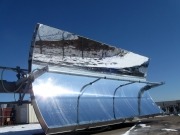
Pew Charitable Trusts, the US-based advocacy organisation, has released a report warning that the competitive position of American industry is at risk from increased competition abroad combined with political uncertainty at home.
The study, Innovate, Manufacture, Compete: A Clean Energy Action Plan, finds that revenue in the global clean energy sector could total $1.9 trillion over the period 2012 to 2018. The US, however, stands at a crossroads with private investment, manufacturing and deployment of renewable energy power constrained by the lack of a long-term, consistent energy policy.
The report additionally makes a number of recommendations which include investments in energy research and development, extension of key manufacturing incentives the creation of a national Clean Energy Standard which sets milestones for deployment of clean energy technology in the electric power sector.
“Industry is telling us in no uncertain terms that the United States needs to adopt clear, consistent, long-term energy policies that allow American businesses to thrive, make our country more energy secure, and advance environmental imperatives,” said Phyllis Cuttino, director of Pew’s Clean Energy Programme. “Our research shows that there is a multi-trillion-dollar opportunity in the clean energy sector. U.S. industry has the capacity to be a leader, provided we have the right policies in place. It’s time for Congress to support a comprehensive energy strategy by delivering long-term certainty for businesses and investors in renewable power.”
The growth of clean energy markets offers the US an important opportunity for innovation, investment, job creation and manufacturing and the Pew report estimates revenue from wind, solar and other renewable energy projects could grow at a compound annual rate of 8 percent, rising from $200 billion in 2012 to $327 billion annually by 2018. US clean energy installations are expected to reach 126GW which would more than double US non-hydroelectric capacity. Nevertheless, the US position is constrained by numerous challenges including tight credit markets, growing international competition and an uneven playing field with fossil fuel interests.
Pragmatic clean energy policies would help to enhance the competitive position of renewable energy in the US. Pew’s research, much of it conducted among business leaders and industry experts, indicates that the US should establish a clean energy standard to guide deployment and investment, significantly increase investment in energy research and development, create a multiyear but time-limited extension of tax credits, level the playing field across the energy sector, create a strategy for market expansion and renew incentives for clean energy manufacturing.
Although based in the US, Pew Charitable Trusts operates globally. Its many activities includes health issues and conservation efforts as well as matters relating to energy. In recent years it has been noted particularly for its efforts to prevent overfishing in the world’s oceans.
Further information:

